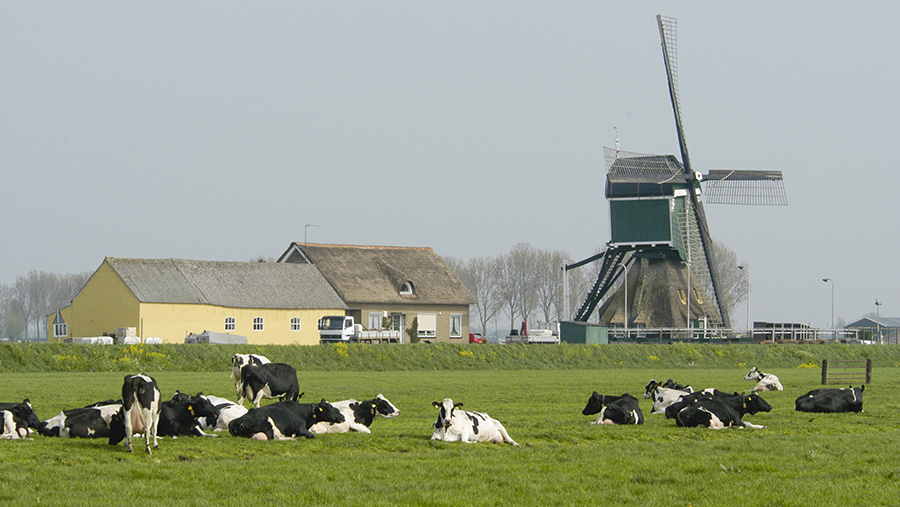Dutch co-op pays farmers to limit milk production
 © Alimdi/Martin Stevens/Imagebroker/Rex/Shutterstock
© Alimdi/Martin Stevens/Imagebroker/Rex/Shutterstock Dutch dairy co-op FrieslandCampina is paying an extra 1.5p/litre to its member dairy producers for the next six weeks to limit production.
It wants to keep milk supply level or below the volume delivered from farms between 13 and 27 December.
The co-op processes about three-quarters of milk produced in the Netherlands and has almost 13,000 Dutch members, another 1,000 in Germany and about 30 in Belgium.
It stressed that the payment was a temporary measure running from 1 January to 11 February 2016 inclusive.
Farmer reaction

© Steffan Hill
Thomas Steele, Kircubbin, Northern Ireland
“I see it as more of a negative move than a positive one – it’s a shame they can’t find another market for the milk – for example drying it to powder. While it would be nice to get the extra money, you can’t just turn milk off like that, you risk fertility and other problems.
“In 2012 we cut back from three times a day milking to twice a day just for a couple of months and then it took us a full year to get the cows back up to where they had been before.”

Gary Mitchell, who milks near Stranraer, south-west Scotland
“A sensible move – here we have the A-B system but this (the FrieslandCampina payment) is a more positive approach.
“No-one could have forecast the way the markets have gone, with the Russian ban and the Chinese market downturn.”
It was necessary because the supply from member dairy farmers in the coming weeks was expected to grow faster than had been forseen and as a result, the company’s dairy processing capacity would not be able to cope between January and mid-February 2016.
See also: Collaborate to beat dairy crisis, Dutch farmers tell British
The payment applies only to members of the co-op and does not cover organic milk production as capacity was sufficient in this area, said Friesland Campina.
Its members delivered about 6.4% (5.8m litres) more milk in 2015 than they did in 2014.
Heavy investment in extra processing capacity had been made over the past few years but milk supply suddenly accelerated as from November 2015.
Due to this, all FrieslandCampina processing capacity was already in use, said the group.
“The possibilities to have the farm milk processed by other dairy companies or to directly sell this to other buyers have been fully made use of as well,” said the co-op.
The supply incentive payment will be made on top of FrieslandCampina’s guaranteed farmgate price for raw milk for January 2016 of about 21.6p/litre, itself a reduction of about 0.55p/litre compared with the December 2016 price.
The guaranteed price applies to a standard litre with a protein content of 3.47%, fat at 4.41% and a lactose content of 4.51%.
The January drop in the guaranteed price was the result of the expectation that the prices paid by customers would fall in January.
Good weather, good quality feed and the fact that producers were keeping cattle for longer were all factors in keeping production high, said a Friesland Campina spokesman.
The European Milk Board (EMB), which lobbies on behalf of about 100,000 milk producers across 15 EU member states, welcomed the move as a key signal and repeated its call for a legal framework for voluntary supply restraint.
“The dairies, too, are making it clear that unchecked growth in volume is problematical, and there must be instruments to counter it,” said Sieta van Keimpema, vice-president of the EMB
“Friesland Campina has opted for a voluntary limit on supply, or a voluntary restraint on supply. Because that is a very effective way of reducing volumes, it means positive action can be taken in the market and distortions prevented.
“This instrument ought to be applied not just at individual dairies, but throughout the EU and thus managed centrally. Initiative on the part of individual dairies is not enough. It is up to politicians in particular to establish the proper legal framework for this, stipulating a market volume that enables prices to cover producers’ costs.”
